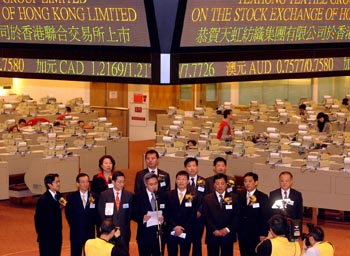Q: It is said that China is encouraging some large SOEs
to go public abroad in order to accelerate the establishment of a
modern corporate system. Why are these companies being encouraged
to get listed abroad, considering there is great domestic demand
for their shares?
A: As the Chinese economy keeps growing, especially since its
entry into the World Trade Organization in 2001, China's capital
market has started to become connected with the international
market. More and more large SOEs are turning their eyes toward the
foreign capital market and gearing up for an overseas
listing.
The most significant reason for Chinese SOEs to get listed abroad
is that overseas listing will provide new impetus to further reform
their companies. Admittedly, overseas markets are more mature and
have higher requirements on listed companies. The process of
becoming listed is a process of self-motivated reform. Being
publicly traded overseas puts an SOE under the scrutiny of more
sophisticated investors and a more mature capital market.
Additionally, the Chinese stock market too often has bee plagued
by non-economic factors, while overseas stock markets enjoy the
advantages of greater flexibility and low cost in refinancing.
This is another important reason why many SOEs want to get
listed abroad. China's SOEs started to enter the overseas capital
market in the early 1990s, first in Hong Kong and then the United
States. In the last few years, several hundred Chinese companies
have been listed in Hong Kong, the United States, Canada and
Australia.
On top of raising capital, these companies have also learned
internationally advanced management models, perfected their
internal system as well as enhanced the company's international
fame, influence and competitiveness.
Foreign individual and institutional investors now have all eyes on
the initial public offerings (IPOs) of Chinese companies, expecting
to find good investment opportunities. In 2003, 48 Chinese SOEs
launched IPOs overseas, raising a total of US$7 billion. In 2004,
the figures rose to 84 and US$11.15 billion respectively. While the
performance of the many overseas-listed Chinese SOEs is generally
satisfactory, several companies suffered huge losses in 2004 due to
dysfunctional internal supervision schemes. This should ring an
alarm for potential IPOs of SOEs
In accordance with requirements of the national economy, China will
insist on the open policy, on bringing the domestic and
international market more closely together, and on more actively
and extensively participating in the process of economic
globalization. In the meantime, China will further facilitate
overseas IPOs of companies by creating a freer environment in terms
of policy and capital.
 |
On December 9, 2004, Tianhong Textile
Group Corp. in Sichuan Province was listed in Hong Kong Stock
Exchange.